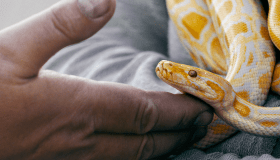
DENVER/October 28, 2021 – Morris Animal Foundation has awarded a grant to researchers at the Royal Veterinary College (RVC), United Kingdom, to study a painful disease common in German shepherd dogs and Leonbergers. The grant is funded by the American German Shepherd Dog Charitable Foundation through Morris Animal Foundation’s Donor-Inspired Study program.
Dr. Brian Catchpole, Professor of Companion Animal Immunology, and Dr. Lucy Davison, MRC Clinician Scientist Fellow and Professor of Veterinary Clinical Genetics, at the RVC, are the recipients of the grant, which focuses on anal furunculosis. Dr. Alison Hall, RVC Postgraduate Research Student and a boarded veterinary internist and practitioner, will be carrying out the research.
Anal furunculosis is a painful disease common in German shepherd dogs and also is seen in Leonbergers. The disease has been recognized for decades, but understanding the genetic underpinnings of anal furunculosis remains elusive.
The disease is characterized by inflammation, ulceration and development of tunnel-like lesions that can extend from the anus into the rectum and colon. Some breeds, including German shepherd and Leonberger dogs, are at high risk for developing perianal fistulas, suggesting that genetic factors are likely involved.
“We’ve been interested in this disease and the associated condition of inflammatory bowel disease for years,” said Dr. Catchpole. “The disease is a significant welfare problem for affected dogs and their owners. Treatment is life-long and expensive. We hope our findings can shed more light on this disease and perhaps lead to new insights on treatment and prevention.”
In the study, the team will sequence the whole genome from banked DNA samples of 10 German shepherd dogs and three Leonbergers with the disease, and five German shepherd dogs and two Leonbergers without the disease. Other dogs will be recruited with Dr. Hall’s assistance.
“We’re building on work our team has previously undertaken on another complex disease, diabetes in dogs,” said Dr. Davison. “We can pull in all these big data sets from different studies and use our computational resources to prioritize genes of interest. One thing that’s important, and that we’re doing in this study, is to ask why certain dogs don’t get the disease. There might be something protective in these dogs that we can mimic in at-risk dogs.”
Once the sequencing is completed, the team will compare their findings to data from other breeds of dogs without disease. This approach will allow the team to identify the most important candidate genes associated with disease as a first step toward prospectively identifying at-risk dogs, as well as new treatment targets.
“This is a frustrating and painful disease that has been a major health concern for German shepherd dog and Leonberger owners. What we learn from this work also could shed light on the immunological defects that lead to this perianal inflammation,” said Dr. Janet Patterson-Kane, Morris Animal Foundation Chief Scientific Officer. “A greater understanding of the immune response in these patients could also have broader application to inflammatory conditions of German Shepherds and other breeds.”
The Foundation’s Donor-Inspired Study program allows individual donors and foundations to directly support research topics for which they have a passion and there is a pressing need. Applications for this grant were reviewed and rated, based on impact and scientific rigor, by a Foundation scientific advisory board.
About Morris Animal Foundation
Morris Animal Foundation’s mission is to bridge science and resources to advance the health of animals. Founded in 1948 and headquartered in Denver, it is one of the largest nonprofit animal health research organizations in the world, investing more than $142 million in over 2,800 critical studies across a broad range of species. Learn more at morrisanimalfoundation.org.




